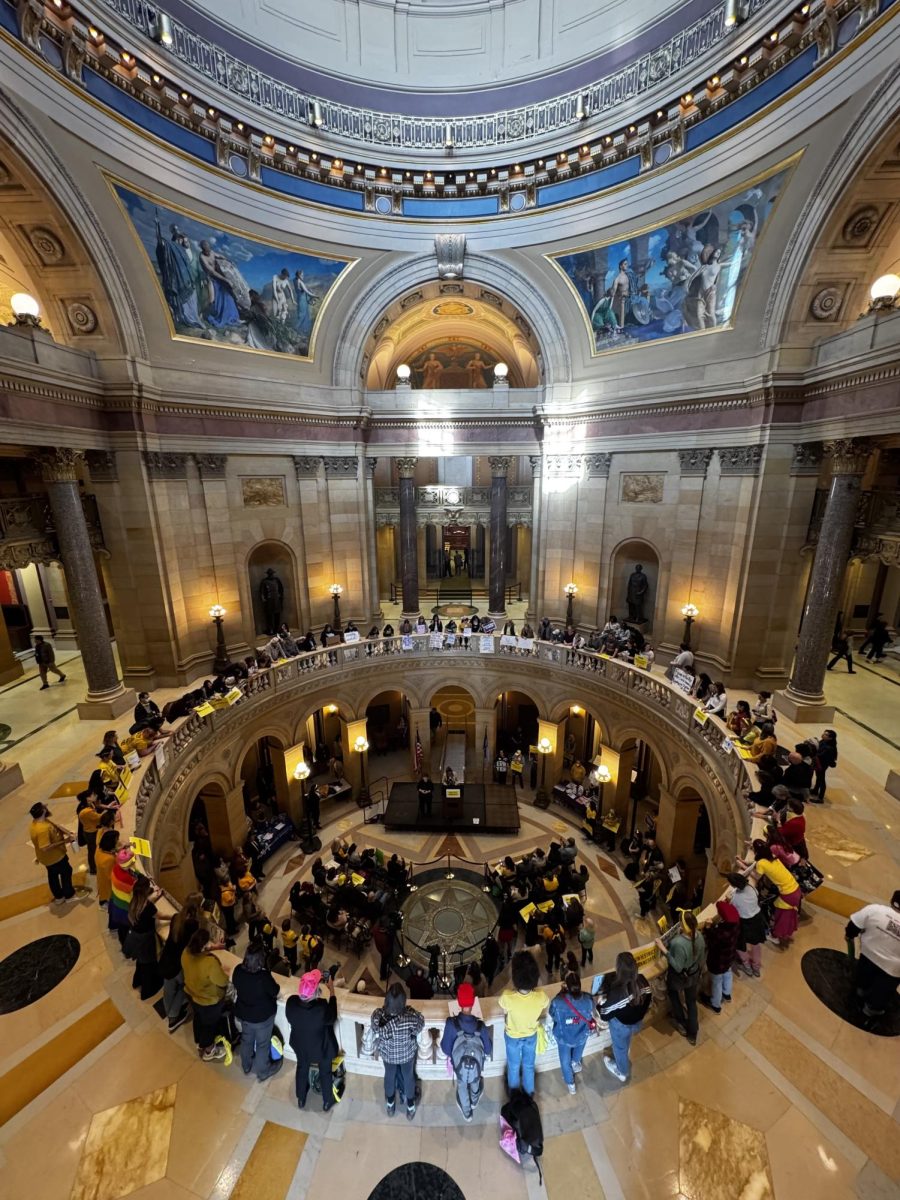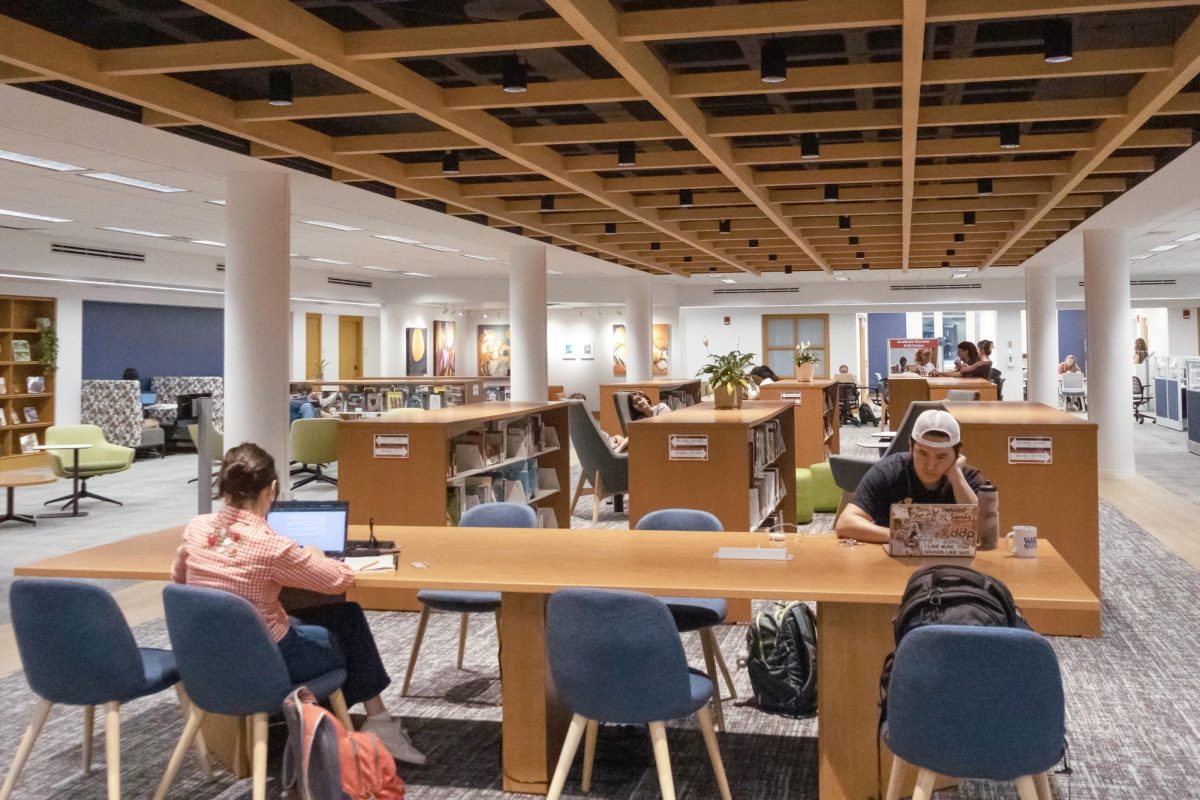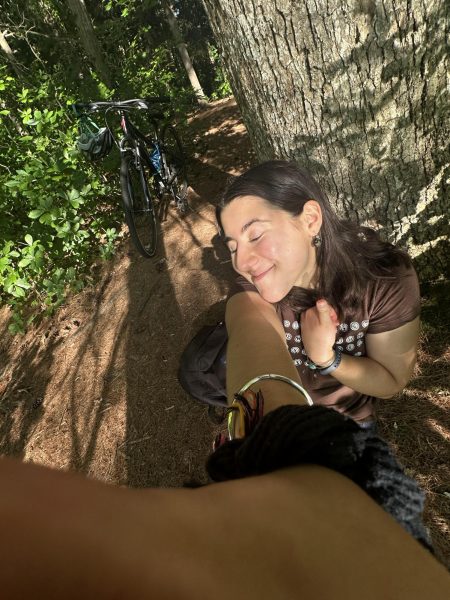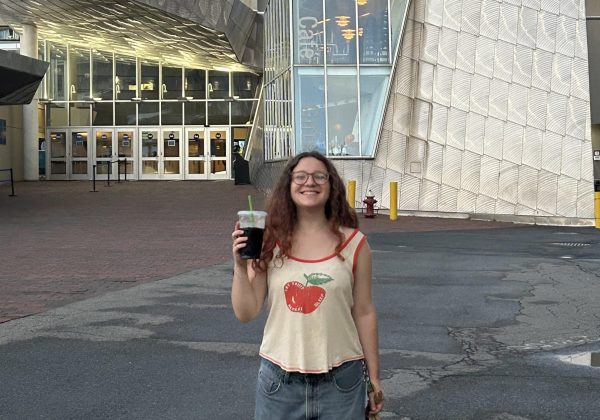On Monday, March 10, dozens of Macalester students traveled to the Minnesota State Capitol to attend Reproductive Freedom Lobby Day. This event, sponsored by the UnRestrict Minnesota coalition, brought local advocates together to voice their opinions to their elected representatives. Students in political science professor Della Zurick’s “Feminist Political Theory” class and members of Pro Choice @ Mac were among those in attendance.
Lobby Day seemed even more urgent that day given the state’s current political climate. At the time, Minnesota’s House of Representatives was about to vote on two Republican bills that would restrict reproductive freedom if passed. The first, House File 25, would funnel taxpayer money into “crisis pregnancy centers, which are unlicensed organizations that do not provide comprehensive reproductive healthcare and do not have licensed physicians or registered nurses on staff,” according to the official Minnesota legislature Democratic Farmer-Labor Caucus website. The other bill, House File 24, authored by Republican State Representative Krista Knudson, “would put politicians in charge of Minnesotans’ most private, personal reproductive healthcare decisions.”
Bills aren’t the only thing putting reproductive freedom at risk in Minnesota. As legislation puts pressure on abortion clinics, staying open and providing vital care has become increasingly difficult.
“The Robbinsdale abortion clinic in the Twin Cities shut down, and it was one of only eight independent abortion clinics functioning in the state,” Emma Henry ’26 said. “Considering [that] Minnesota is one of the only abortion safe havens in the Midwest, only having eight clinics is quite unfortunate.”
These topics were present as volunteers gathered in the Christ Lutheran Church, which stands kitty-corner to the Capitol. “There was a lot of conversation about the anxiety given the current political climate,” Henry said, yet the energy of the room was anything but dour. “It didn’t feel very doom and gloom that you expect given the situation. There was a lot of love, there was a lot of solidarity,” Henry continued. Repeat volunteers hugged and greeted one another, back for another year of lobbying.
As the event began, people sat at tables separated by their district, and shared what motivated them to show up. Pro Choice @ Mac, an organization led by Henry and Cait Lopata ’26 and supported by a handful of other members, were there for a very specific reason.
The organization was re-established in 2023 by Henry after the club lost members and momentum over the pandemic. Chartered through Pro Choice Minnesota, it works to, in part, fight for legal, safe and accessible abortion access. “But [Pro Choice @ Mac] is not just abortion,” Henry clarified, “it’s talking about menstrual access, family planning, sexual education [and more]”.
As individuals, Henry and Lopata were motivated by much more personal stories.
For Henry, this inspiration is familial. Her grandfather was an abortion clinic escort in the 1960’s and stayed informed on issues involving reproductive freedom well into his 90s. Her mother receiving an abortion in college also contributed to Henry’s passion in pro-choice advocacy.
“Having that abortion was life saving,” Henry said about her mother.
Lopata was also motivated by her mother to get involved in reproductive freedom movements.
“[My mom] got pregnant with me and then developed a bunch of health complications while [she was] pregnant,” Lopata said. “[She] was in labor for multiple days and almost died giving birth to me, hence why I’m an only child.”
Juliana Leach ’28 was also led to the lobby day by her own life experiences. A Florida native, Leach has always been adamantly pro-choice and a supporter of reproductive freedom. Moving to Minnesota, though, is what allowed her to become outspoken about it.
“Even though it is very hard to be brave in a world that encourages compliance, it is important to stick up for what you believe in,” Leach said. “And if that means you have to move to somewhere where it is safe to do so, then do it like if you have the opportunity, then do it.”
Groups were able to directly voice what they believe in when they met with their elected representatives. Macalester’s contingent, along with a few fellow Ward 3 residents, met with Rep. Kaohly Vang Her, Rep. Erin Koegel and Senator Erin Murphy. Students thanked the representatives for their work fighting for reproductive rights, shared the reasons why they care about this issue and asked about current reproductive justice happenings in Minnesota. The representatives shared their backgrounds and told students about the work they do.
“[Meeting your representatives] helps humanize them,” Lopata said. “A big goal is to realize that they are people and open to critique, and you’re able to voice your opinion to them. And I felt really heard by Representative Her.”
The conversational nature of these meetings with elected officials formed a stark contrast to Leach’s previous experience.
“[In] the south, you respect the people who are in charge,” Leach said. “It’s very much, ‘Respect authority. Don’t question anything. Just stay in line, and then you’ll be rewarded by the system.’ But here—I [had] never felt more seen by someone in charge. … Representative Her addressed me by my name at the very end of that meeting. And I [thought], ‘Oh, my goodness, this authority figure is seeing me and respecting me as a young adult.’”
The lobby day wrapped up with a rally in the rotunda of the Minnesota State Capitol. The multi-hour event featured a long list of speakers, including elected officials, activists and staff members of organizations. Participants, sporting handmade signs, filled the bottom floor of the rotunda, crowded around the balcony on the next level up and staffed tables advertising their organizations.
The rally provided visual evidence of the solidarity between people fighting for reproductive justice. For Henry, it was powerful to see members of the Reproductive Freedom Caucus gathered behind Rep. Leigh Finke, the House chair of the caucus and first transgender legislator in the Minnesota House of Representatives, as she gave her speech. Lopata was struck by the sense of coalition she felt upon seeing the numerous organizations in attendance, even recognizing some of the people who work for them.
“I think that one of the best strengths of any kind of rally is strength and community,” Leach added. “I know that scaring people isn’t always a great tactic, but I hope we scared some people into saying, ‘[Reproductive rights] should be accessible to everyone.’”
Leach continued with a message to those witnessing movements for reproductive freedom.
“Please hear us. Please see that we are here,” Leach said. “We are loud, and we are going to keep on fighting, regardless of the political climate right now. And even though we have achieved so much here, there’s still so much more to achieve.”













